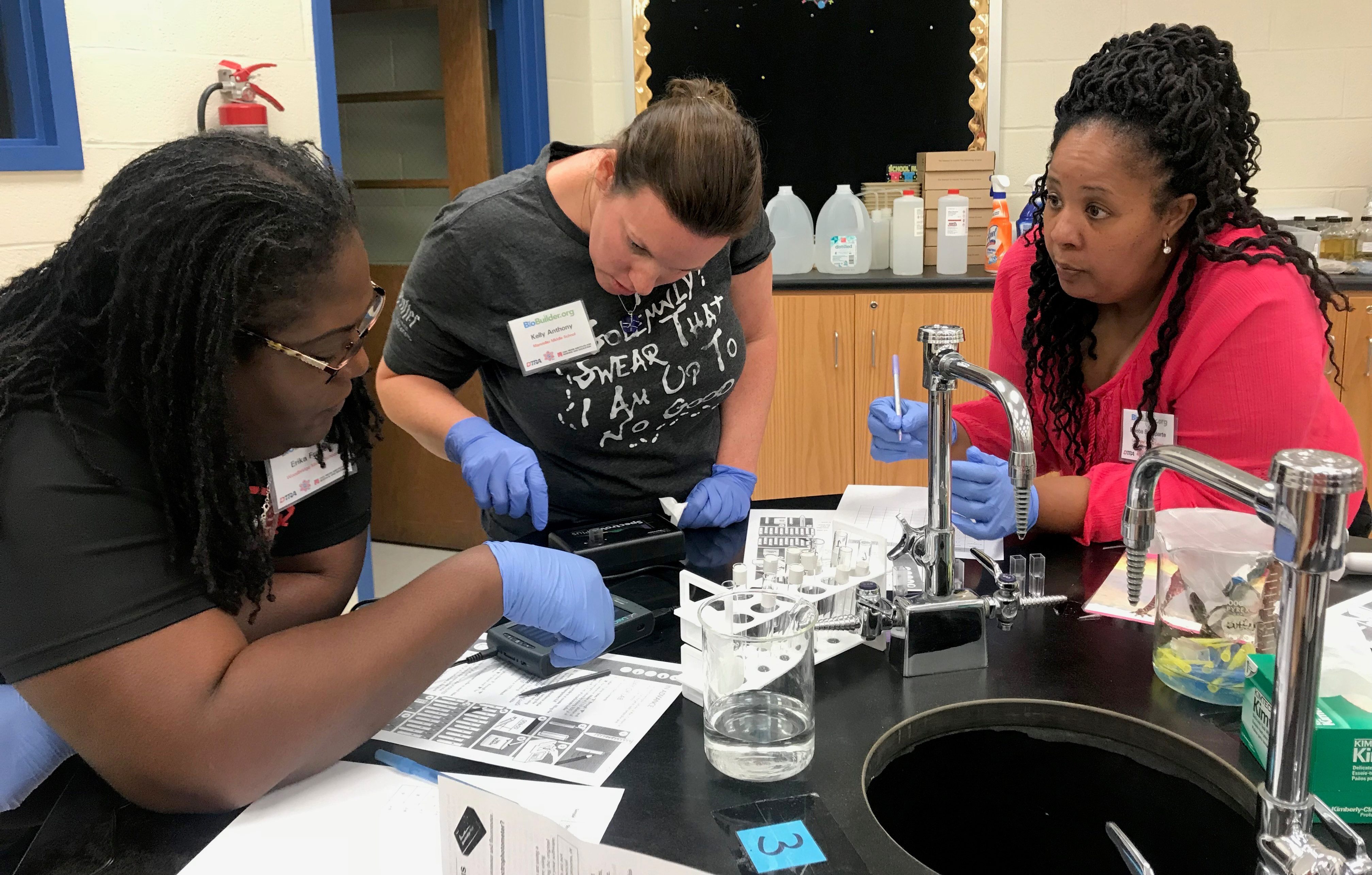 As a former high school science teacher at Chantilly and Thomas Jefferson in Fairfax County, Andrea Cobb, (PhD in biochemistry) saw the difference with her own eyes. After sending her students off to a summer research experience through Mason’s Aspiring Scientist’s Summer Internship Program (ASSIP), they would return in the fall as changed students. “They came back to school looking and sounding like inspired scientists, with a resume full of authentic research under their belts. I could see the difference in their eyes and read it in their papers,” says Cobb.
As a former high school science teacher at Chantilly and Thomas Jefferson in Fairfax County, Andrea Cobb, (PhD in biochemistry) saw the difference with her own eyes. After sending her students off to a summer research experience through Mason’s Aspiring Scientist’s Summer Internship Program (ASSIP), they would return in the fall as changed students. “They came back to school looking and sounding like inspired scientists, with a resume full of authentic research under their belts. I could see the difference in their eyes and read it in their papers,” says Cobb.
Fast Forward: Today Cobb is the Director at ASSIP and has hands-on evidence of that evolution, from student learner to avid researcher, reflected in the more than 100 students that passed through the doors last summer – both high schoolers from across the region and undergraduates from across the nation.
Launched in 2007 by Dr. Lance Liotta, Dr. Emanuel Petricoin III, Dr. Virginia Espina, and Amy Adams, ASSIP gives high school and undergraduate students with an interest in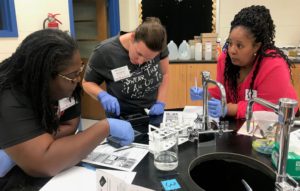 STEM access to real-world, research. ASSIP attracts students from a wide range of schools — from Virginia (including UVA and William and Mary), to California, (including Stanford and Berkeley), as well as students from smaller schools like Troy University and Carleton College. Mentors from Mason’s College of Science donate their time each summer to deliver this rich experience.
STEM access to real-world, research. ASSIP attracts students from a wide range of schools — from Virginia (including UVA and William and Mary), to California, (including Stanford and Berkeley), as well as students from smaller schools like Troy University and Carleton College. Mentors from Mason’s College of Science donate their time each summer to deliver this rich experience.
ASSIP’s reputation is almost without parallel. “Aside from a similar program being run, and richly funded, by NIH; ASSIP is in a league of our own,” says Cobb.
The program boasts a long string of success stories, including 2018 ASSIP alums Ankit Gupta and David Rudo who won Virginia Congressional Representative Gerry Connelly’s APP Challenge (a national competition aimed at encouraging U.S. high school students to learn how to code by creating their own applications) with their leading-edge technology known as “Stroke Save.”
As Cobb reports, ASSIP and the team behind it, had much work to do. Their intention was to go full steam ahead and grow the program exponentially. “We see this program as a game changer for our students. And to be truly successful, we need to broaden our reach,” explains Cobb.
For 2019, their goals were aggressive: Grow from 100 students and 25 mentors in 2018, to 200 students with additional mentors this year.
But the challenge for Cobb was clear: funding. They would need to supplement their budget with the dollars necessary to overcome a number of critical roadblocks preventing them from scaling up including conducting background checks, hiring a work flow manager, developing a training program for grad student mentors and a myriad of other essential elements.
That’s where 4-VA came in. “This program aligns nicely with our 4-VA goals,” says Mason’s Campus Coordinator and Associate Provost Janette Muir. “We identify and support those jewels of ideas that create opportunities for higher education. We see the possibilities and provide greater access.”
Now, thanks to that grant from 4-VA, Cobb put the ASSIP growth plans into motion. The 2019 summer program includes students from 54 universities and 171 high schools worldwide. Cobb notes that there are 135 participants researching with 38 mentors. Of the 135 students, 41 are college students from at least 16 different universities in 7 states (Virginia, Pennsylvania, Maryland, DC, Florida, Kentucky and New York). Virginia universities represented include William and Mary, George Mason, University of Virginia, the University of Mary Washington, James Madison University, Virginia Tech and Northern Virginia Community Colleges. The high school students hail from 28 different high schools within 5 states (Oregon, California, Maryland, New Jersey and Virginia).
In addition to the 135 students mentored for the entire summer, ASSIP has expanded access to real world research through several shorter duration courses. This summer, 107 students attended research-related short courses including Introduction to Bioinformatics, Hands-On Introduction to Data Sciences and Life Sciences Proposal Preparation Boot Camp.
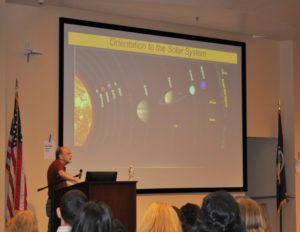
With that, they have welcomed 242 students for research this summer, well exceeding their 2019 goal of 200 students. That welcome officially kicked off June 17 with the ASSIP orientation. The students filled the Verizon auditorium at the Sci-Tech campus, brimming with ideas, energy and enthusiasm. After settling in to their seats in the auditorium, the orientation started strong with a presentation by Mason’s own Dr. Michael E. Summers, a planetary scientist who specializes in the study of structure and evolution of planetary atmospheres. Summers reviewed for the students his role and experiences on the mission teams of several NASA space probes considering science planning and interpretation of spacecraft observations. He is currently a co-investigator on the NASA New Horizons mission to the Pluto-Charon double planet, where he serves as the deputy lead of the Atmospheres Theme Team.
Following Summers’ presentation, students were divided into groups so that they could learn more about important safety procedures in advance of their summer research.
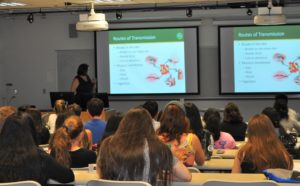
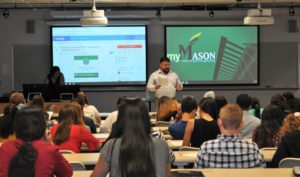
The afternoon was filled with copious note taking, thoughtful discussion, and group decision-making. For 17-year-old Divjot Bedi, a rising senior at Thomas Jefferson High School for Science and Technology, it was a day to whet his appetite for a deep dive into another summer of research. This will be Bedi’s second stint at ASSIP and he can’t wait to get started. “Last year, I gained 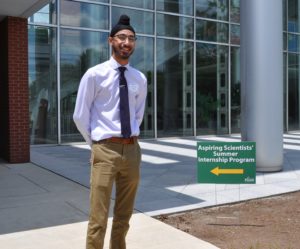 a lot of strengths going through this program, but, importantly, I also learned a lot about my weaknesses, it showed me where I needed to focus to make the most of my time here,” said Bedi. “This program fosters creativity, imagination, and collaboration — it’s truly exciting.” Bedi emphasizes the importance and value of working with a mentor. “I was able to do research with Dr. Caroline Hoemann last year, who is in the Bioengineering Department. We analyzed white blood cell movement and how that might be applied to cancer research and therapy.” Bedi is clearly passionate about his work through ASSIP, but credits the program for giving him hands-on access to important research that brings his passion to life.
a lot of strengths going through this program, but, importantly, I also learned a lot about my weaknesses, it showed me where I needed to focus to make the most of my time here,” said Bedi. “This program fosters creativity, imagination, and collaboration — it’s truly exciting.” Bedi emphasizes the importance and value of working with a mentor. “I was able to do research with Dr. Caroline Hoemann last year, who is in the Bioengineering Department. We analyzed white blood cell movement and how that might be applied to cancer research and therapy.” Bedi is clearly passionate about his work through ASSIP, but credits the program for giving him hands-on access to important research that brings his passion to life.
Even with the heavy lift of the subject matter during the orientation, it was clear that the aspiring scientists concluded the day more enthused then when they walked in that morning.
Concludes Cobb, “This funding couldn’t have come at a better time. Imagine the possibilities; imagine the real-world difference this will make. We are so appreciative of the 4-VA support.”

